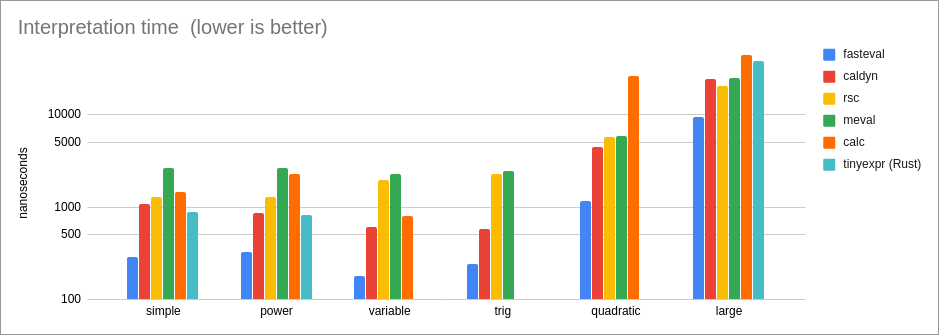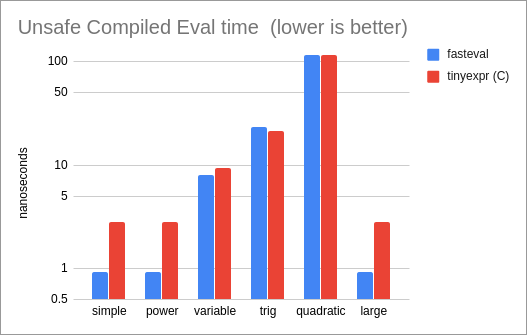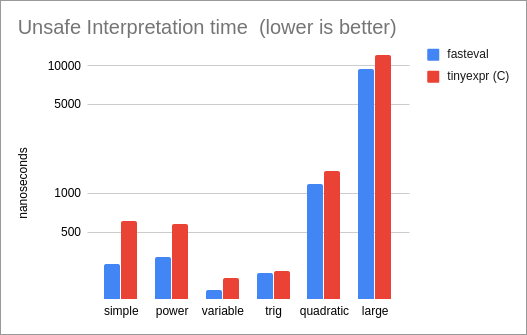1
2
3
4
5
6
7
8
9
10
11
12
13
14
15
16
17
18
19
20
21
22
23
24
25
26
27
28
29
30
31
32
33
34
35
36
37
38
39
40
41
42
43
44
45
46
47
48
49
50
51
52
53
54
55
56
57
58
59
60
61
62
63
64
65
66
67
68
69
70
71
72
73
74
75
76
77
78
79
80
81
82
83
84
85
86
87
88
89
90
91
92
93
94
95
96
97
98
99
100
101
102
103
104
105
106
107
108
109
110
111
112
113
114
115
116
117
118
119
120
121
122
123
124
125
126
127
128
129
130
131
132
133
134
135
136
137
138
139
140
141
142
143
144
145
146
147
148
149
150
151
152
153
154
155
156
157
158
159
160
161
162
163
164
165
166
167
168
169
170
171
172
173
174
175
176
177
178
179
|
# fasteval
Fast and safe evaluation of algebraic expressions
`fasteval` is a library for parsing, compiling, and evaluating algebraic expressions.
It can be used directly as a calculator language (much like `python`), and it is
an excellent foundation for building higher-level-languages.
Documentation:
* [API Reference (docs.rs)](https://docs.rs/fasteval/)
## Usage
Add this to your Cargo.toml:
[dependencies]
fasteval = "0.2.4"
You should **always** build with `RUSTFLAGS="--emit=asm"` because [it greatly improves LLVM's compile-time optimizations](http://likebike.com/posts/How_To_Write_Fast_Rust_Code.html#emit-asm).
If you are using a 'nightly' Rust compiler, you can build with `--features nightly` to enable optimizations that aren't yet available in 'stable' Rust.
You can build with `--no-default-features` to disable alphabetical keywords like `and`, `or`, `NaN`, `inf`. (These words might be important to your applications.)
You can build with `--features unsafe-vars` to enable [Unsafe Variables](https://docs.rs/fasteval/#unsafe-variables).
## Features
* No dependencies.
* Safe execution of untrusted expressions.
* Works with stable Rust.
* Supports interpretation (i.e. parse & eval) as well as compiled execution (i.e. parse, compile, eval).
* Supports Variables and Custom Functions.
* `fasteval` is a good base for building higher-level languages.
* Supports many built-in functions and constants.
* Supports all the standard algebraic unary and binary operators (+ - * / ^ %),
as well as comparisons (< <= == != >= >) and logical operators (&& ||) with
short-circuit support.
* Easy integration into many different types of applications, including scoped evaluation.
* Very fast performance.
## Easy Example
Here is one simple example. See the [API Reference](https://docs.rs/fasteval/#examples) for many more!
The `ez_eval()` function performs the entire allocation-parse-eval process
for you. It is slightly inefficient because it always allocates a
fresh [`Slab`](https://docs.rs/fasteval/latest/fasteval/slab/index.html), but it is very simple to use:
```rust
fn main() -> Result<(), fasteval::Error> {
// This example doesn't use any variables, so just use an EmptyNamespace:
let mut ns = fasteval::EmptyNamespace;
let val = fasteval::ez_eval(
"1+2*3/4^5%6 + log(100K) + log(e(),100) + [3*(3-3)/3] + (2<3) && 1.23", &mut ns)?;
// | | | | | | | |
// | | | | | | | boolean logic with short-circuit support
// | | | | | | comparisons
// | | | | | square-brackets act like parenthesis
// | | | | built-in constants: e(), pi()
// | | | 'log' can take an optional first 'base' argument, defaults to 10
// | | numeric literal with suffix: p, n, µ, m, K, M, G, T
// | many built-in functions: print, int, ceil, floor, abs, sign, log, round, min, max, sin, asin, ...
// standard binary operators
assert_eq!(val, 1.23);
Ok(())
}
```
## REPL Demo
```text
github.com/likebike/fasteval$ rlwrap cargo run --release --example repl
Finished release [optimized] target(s) in 0.01s
Running `target/release/examples/repl`
>>> print("Hello fasteval", 1, 2, 3)
Hello fasteval 1 2 3
3
>>> _ + 1
4
>>> _ + 1
5
>>> _ * 2
10
>>> _ ^ 0.5
3.1622776601683795
>>> let a = 1
1
>>> let b = a + 1
2
>>> let c = a + b * 3
7
>>> a + b + c
10
>>> push
Entered scope[1]
>>> let b = b + 10
12
>>> a + b + c
20
>>> pop
Exited scope[1]
>>> a + b + c
10
>>> 1+2*3/4^5%6 + log(100K) + log(e(),100) + [3*(3-3)/3] + (2<3) && 1.23
1.23
>>> 1+2*3/4^5%6 + print("log(100K) =",log(100K)) + log(e(),100) + [3*(3-3)/3] + (2<3) && 1.23
log(100K) = 5
1.23
```
## Safety
`fasteval` is designed to evaluate untrusted expressions safely. By
default, an expression can only perform math operations; there is no way
for it to access other types of operations (like network or filesystem or
external commands). Additionally, we guard against malicious expressions:
* Expressions that are too large (greater than 4KB).
* Expressions that are too-deeply nested (greater than 32 levels).
* Expressions with too many values (greater than 64).
* Expressions with too many sub-expressions (greater than 64).
All limits can be customized at parse time. If any limits are exceeded,
[`parse()`](https://docs.rs/fasteval/latest/fasteval/parser/struct.Parser.html#method.parse) will return an
[Error](https://docs.rs/fasteval/latest/fasteval/error/enum.Error.html).
Note that it *is* possible for you (the developer) to define custom functions
which might perform dangerous operations. It is your responsibility to make
sure that all custom functionality is safe.
## Performance Benchmarks
Here is a short summary of the performance benchmarks. For a more complete report and anlysis, see the [official documentation](https://docs.rs/fasteval/#performance-benchmarks).
### Charts
Note that the following charts use logarithmic scales. Therefore, tiny
visual differences actually represent very significant performance
differences.
**Performance of evaluation of a compiled expression:**

**Performance of one-time interpretation (parse and eval):**

**Performance of compiled Unsafe Variables, compared to the tinyexpr C library (the
only other library in our test set that supports this mode):**

**Performance of interpreted Unsafe Variables, compared to the tinyexpr C library (the
only other library in our test set that supports this mode):**

### Summary
The impressive thing about these results is that `fasteval` consistently
achieves the fastest times across every benchmark and in every mode of
operation (interpreted, compiled, and unsafe). It's easy to create a
design to claim the #1 spot in any one of these metrics by sacrificing
performance in another, but it is difficult to create a design that can be
#1 across-the-board.
Because of the broad and robust performance advantages, `fasteval` is very
likely to be an excellent choice for your dynamic evaluation needs.
## License
`fasteval` is distributed under the terms the MIT license.
See [LICENSE](https://github.com/likebike/fasteval/blob/master/LICENSE) for details.
|